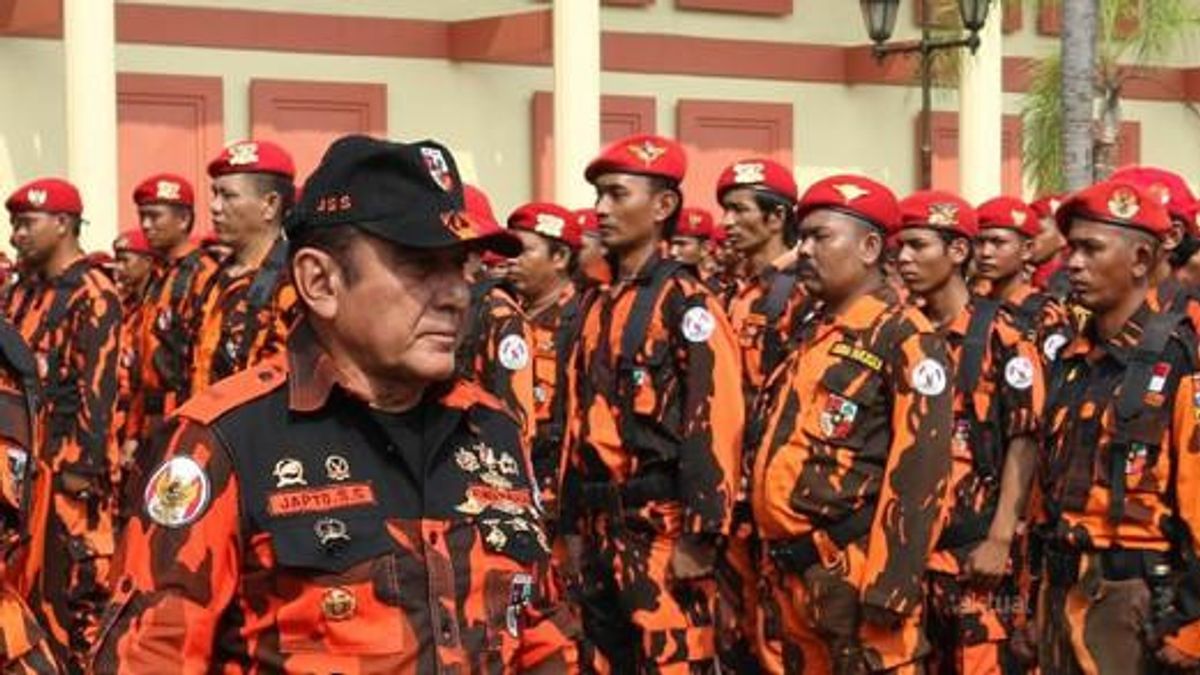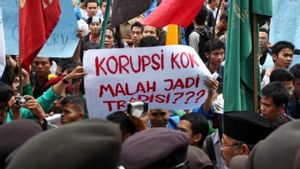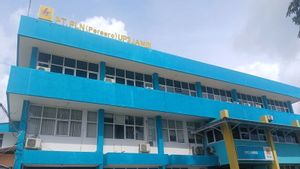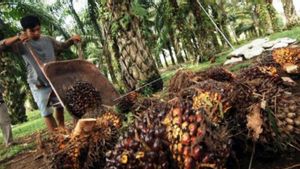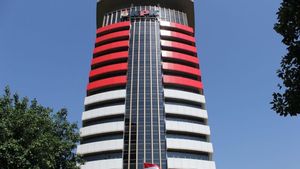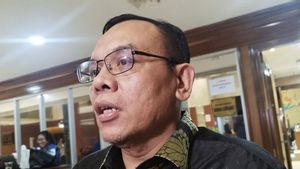JAKARTA - Two days before his 60th birthday, Pemuda Pancasila (PP) appointed President Joko Widodo (Jokowi) as an honorary member. Jokowi also opened the Pancasila Youth X Grand Conference. On that occasion, Jokowi praised Pemuda Pancasila's role in organizing the national political agenda. Pemuda Pancasila has gone through a long historical journey as well as organizational evolution and development. What is the history of the Pancasila Youth like?
The Great X Pemuda Pancasila Conference was held at the Lagoon Garden, Sultan Hotel, Jakarta. Apart from Jokowi, Ma'ruf was also appointed as an honorary member in a series of agenda events. Both received membership cards which were handed over directly by the General Chairman of the Pancasila Youth National Council (MPN), Japto Soerjosoemarno.
After Ma'ruf's appointment, Japto said, as member card holders, Jokowi and Ma'ruf would receive protection from Pemuda Pancasila. "Yesterday we picked up Mr. Jokowi. Someone asked, 'How come you take it (membership card) from the bag, not on the tray?' This is a sign. Javanese people have a philosophy, if in my pocket, I am responsible for protecting whoever is the Pancasila Youth member card holder, "said Japto, quoted by CNN.
Deputy Chairman of MPN Pemuda Pancasila Bambang Soesatyo (Bamsoet) also stated the same thing. Bambang Soesatyo emphasized that the PP would not allow anyone to interfere with Jokowi-Ma'ruf. Bamsoet even said that PP would become violent thugs if Jokowi-Ma'ruf was harassed.
"We will turn into thugs and be savages again when anyone disturbs the sovereignty of the nation, the Republic of Indonesia, Pancasila and tries to disturb President Jokowi as head of state," said Bamsoet in his speech at the opening of the Pancasila X Pemuda Grand Conference.
Even so, Bamsoet said Pemuda Pancasila was not an ordinary gangster organization. Pemuda Pancasila has grown, Pemuda Pancasila "no longer uses machetes, tattoos or thick mustaches. We are now prioritizing brains, thoughts, knowledge and ingenuity in controlling the territory."
AH Nasution and the background of the Pancasila Youth

The founder of Pemuda Pancasila is Abdul Haris Nasution. Pemuda Pancasila was founded on October 28, 1959, to coincide with the commemoration of the 31st Youth Pledge. The initial goal of forming Pemuda Pancasila was to face the domination of Pemuda Rakyat (PR), a wing organization under the Indonesian Communist Party (PKI).
To further understand the background to the founding of the Pemuda Pancasila, we must go back to the mid-1950s. At that time Nasution was still active in politics. The party he founded, the Indonesian Independence Support Association (IPKI), followed the 1955 elections. IPKI was founded by Nasution together with Colonel Gatot Subroto and Colonel Azis Saleh.
IPKI hopes in the election are big. They crave a mass base among former TNI fighters and soldiers. Yes, at that time the army could still vote and do politics. But that hope was dashed. Written by Tirto, IPKI was even defeated by Nahdlatul Ulama (NU) who won number 3 and PKI in position 4. At the end of 1955, President Soekarno summoned Nasution, who had expired his suspension.
Yes, in previous years Nasution was suspended in the aftermath of the events of 17 October 1952. Reported by Kompas.com, on 17 October, military officers along with 30 thousand demonstrators rallied at the Merdeka Palace, along with tanks, cannons, and artillery weapons directed at Palace. But this was not rebellion, much less assault. They demanded the dissolution of parliament and an end to conflicts within the military.
Back to the time when Nasution's suspension ended. Nasution returned to his post as Army Chief of Staff (KSAD). According to Loren Ryter in a paper in the Indonesian journal Pemuda Pancasila: The Last Loyalist Free Men of Suharto's New Order, Nasution was the man behind the success of the lobby which prompted Soekarno to issue a Presidential Decree on July 5, 1959.
The decree had an impact on a number of things, such as changing the form of government from a parliamentary system to a presidential system, abolishing the constituent and DPR results from the 1955 election, forming the DPR GR, removing the Prime Minister, replacing the 1950 UUDS with the 1945 Constitution as the basis of the state, increasing Soekarno's power and starting. The dual function of ABRI.
At that time the PKI was at its strongest. This strength increased when Pemuda Rakyat was founded as a PKI youth organization. Nasution did not want to lose. Several months after the decree was issued, on 28 October 1959, Pemuda Pancasila was declared a youth organization under the IPKI. Pemuda Pancasila provoked many army children to join.
[/ read_more]
The organizational development of the Pancasila Youth
The name Pemuda Pancasila began to fly in 1965, to be precise during the G30S incident. Ulf Sandhaussen, in the Indonesian Military Politics 1945-1967, tells of the massacre carried out by Pemuda Pancasila with SOKSI - which was controlled by the army - as well as Muslim and Christian groups in North Sumatra. Their targets were people with the brand of communists.
Ian Douglas Wilson, in the Politics of Rationing Preman: Ormas and Street Power in Post-New Order Indonesia, explains the greatness of Pemuda Pancasila during the New Order era. Pemuda Pancasila was not disturbed, even during the period when the mysterious shooting operation (Petrus) was underway. Almost no members - if you don't want to be called thugs - of Pemuda Pancasila are touched.
The greatness of Pemuda Pancasila provoked more people to enter. Most of them are thugs. All of them are interested in wearing orange striped suits, the uniforms of the Pancasila Youth greatness. The image of the Pancasila Youth at that time was indeed interesting. They secured the perception of being a nationalist organization backed by the army.
During the New Order era, Pemuda Pancasila developed three principles: muscles, speech, and brain. The meaning behind this is that Pemuda Pancasila wants its members not only to be strong and brave physically, but also to speak well and think cleverly and cleverly.

Quoted from the journal Pemuda Pancasila and the New Order Repressive Regime by Abdul Arif, the three principles are the meaning of the orange striped color of the Pancasila Youth uniform. Changing the uniform that was originally plain orange to striped orange, Pemuda Pancasila wants to highlight these three strengths.
Another symbol system of Pemuda Pancasila is a logo consisting of stars, chains, trees, bulls, and rice and cotton. Quoted from the Pemuda Pancasila Malang City website, the star means the one and only Godhead. The chain symbolizes Just and Civilized Humanity. The image of a green banyan tree is interpreted as Persatuan Indonesia.
The symbols in the Pemuda Pancasila logo are interpreted as elements of Pancasila. Including the head of a bull which symbolizes democracy led by wisdom in the representative consultations, as well as rice and cotton which represent social justice for all Indonesian people.
[/ read_more]
Japto Soerjosoemarno's leadership
At the Pancasila III Youth Conference in 1981 in Cibubur, Japto Soerjosoemarno was elected chairman. Japto's leadership at Pemuda Pancasila lasts until now. Japto is the younger brother of actress Marini, son of Major General Soerjosoemarno and Dolly Zegerius, a Dutch-Jew.
Since he was young, Japto is a respected figure. He leads the Siliwangi Boys Club (234-SC) gang, whose members consist of smoker Djie Sam Soe. Loren Ryter, in the book Pemuda Pancasila: The Last Loyalist Free Men of Suharto's New Order tells, "The leaders and members of Pemuda Pancasila think he is smart because he (Japto) is of Jewish descent."

During the New Order era, Japto brought PP to become a youth organization under the Golongan Karya Party (Golkar). By Golkar, Pemuda Pancasila was used to mobilize support from young voters during the general elections held by the New Order. It was during this period that the closeness of Japto and the New Order figures strengthened.
The New Order also made use of Pemuda Pancasila, along with Pemuda Panca Marga (PPM), and the Indonesian Retired Boys and Girls Communication Forum (FKPPI) to intimidate and attack opponents and critics of the Soeharto government. After Soeharto resigned, several members of Pemuda Pancasila were used as Self-Defense Forces (Pam Swakarsa).

Ian Douglas Wilson, in the Politics of Rationing Thugs: Ormas and Street Power in Post-New Order Indonesia also explained how Pemuda Pancasila members remained in the nightlife industry in Jakarta. Not only that. Pemuda Pancasila is also engaged in land issues.
"Pemuda Pancasila regularly works on behalf of property tycoons like Tommy Winata to forcibly vacate people's lands and similar cooperation also continued after the New Order," Wilson wrote.
With all the development and organizational evolution, Pemuda Pancasila under Japto was an organization that Nasution had never imagined. If anything is left, it should be the anti-Communist spirit that has remained to this day.
* Read other information about PEMUDA PANCASILA or read other interesting writings from Yudhistira Mahabharata.
MEMORY Other[/ read_more]
The English, Chinese, Japanese, Arabic, and French versions are automatically generated by the AI. So there may still be inaccuracies in translating, please always see Indonesian as our main language. (system supported by DigitalSiber.id)
